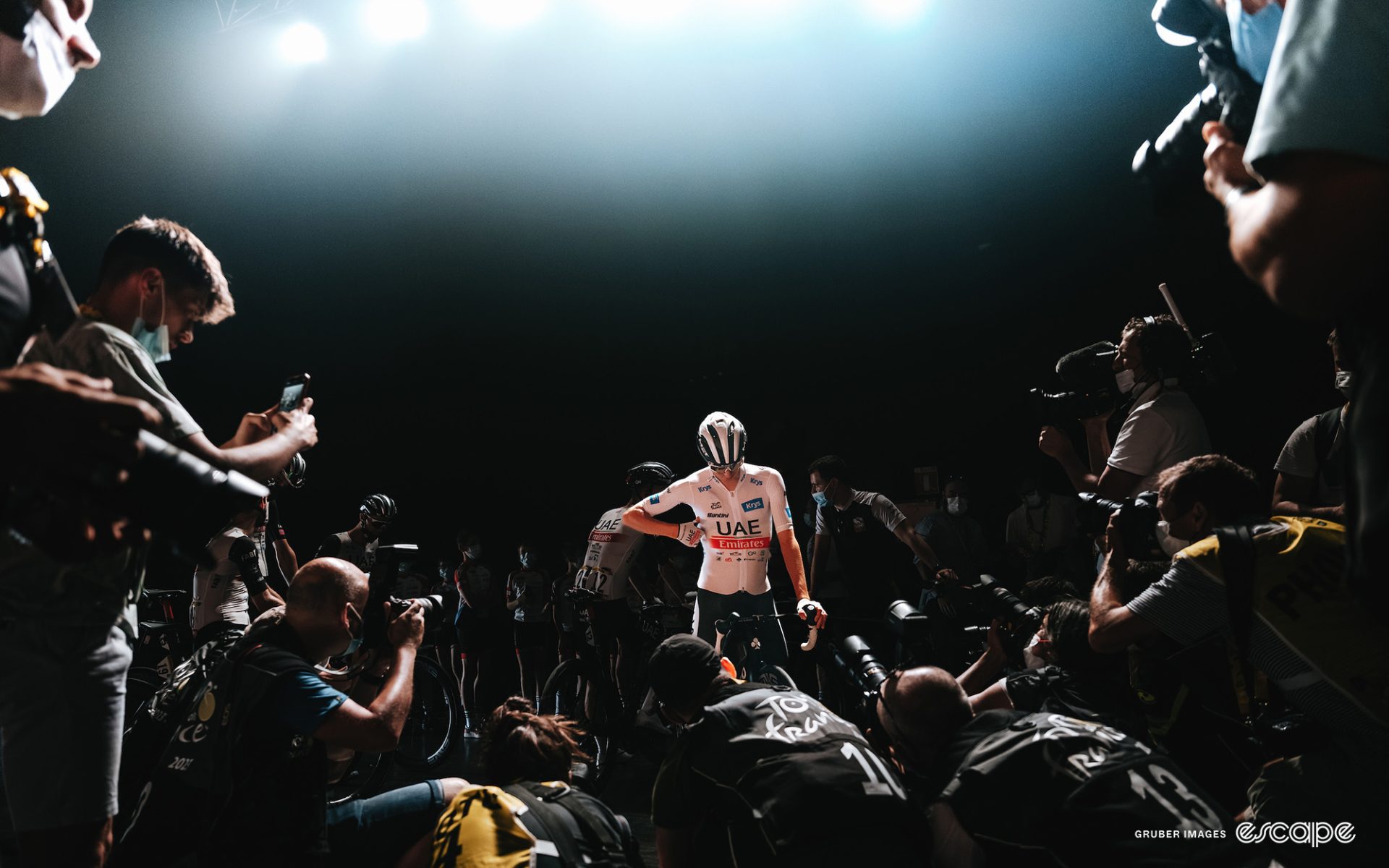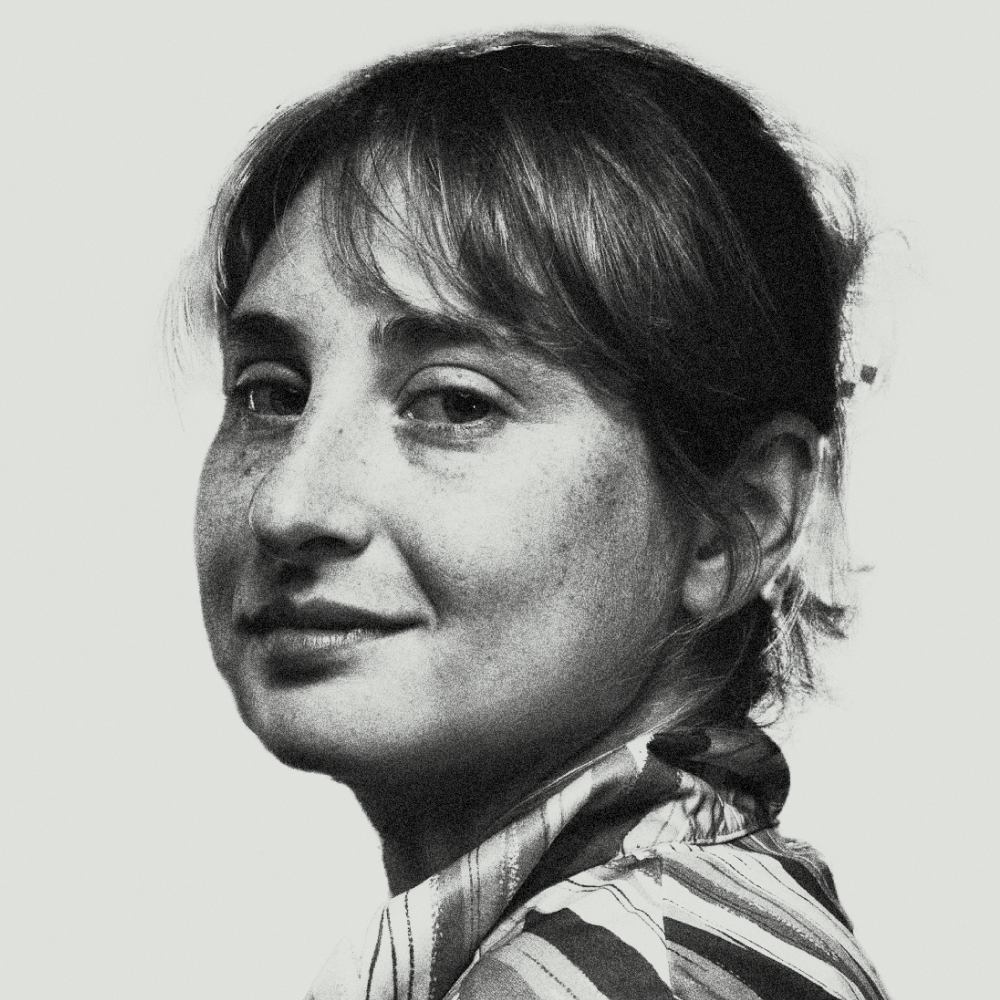It’s almost unthinkable that three years ago, we were describing Tadej Pogačar as one would describe the Terminator – a threat that would plague the peloton with his unbeatableness for maybe a decade, as he was only twenty-one at the time. Pogačar, having unexpectedly won the Tour against Primož Roglič, a man who has achieved folk hero status in their home country, was in a rather horrible situation in terms of having to be in public life. Not only was he not used to the limelight, all of the limelight was suddenly upon him. Naturally, he retreated into himself and those early interviews – in both English and Slovene – are the definition of defensive and dull, much as we describe Vingegaard’s interviews now.
While it remains to be seen whether time will wear down Vingegaard’s icy facade, Pogačar could not be more different than the very young man he was in 2020. He has brightened up considerably, has let his playful nature come through in everything he does – from photobombing teammates to posing for silly pictures to interviews, to how he rides, which is best described as dynamic and spirited. To say he is a fan favorite is an understatement. He has gone from being reviled to being beloved.
Watching this development has been fascinating. Matej Mohorič, in his press conference, said something interesting about emotion on the bike, which is that it often gets in the way of one’s most calculated decisions. Yet it’s hard to describe Pogačar’s riding as anything but emotional – the emotions involved are primarily anticipation, joy, determination, and excitement. Yet this year, we saw a new side of Pogačar he himself revealed to us in his post-race press conference: real suffering. Despair, even.
“I [didn’t] know that I can suffer when I’m super, super shit and low. I pushed through. This was a big, good lesson for me,” he said.
The truth is, even though he struggled a bit last year against Vingegaard, at no time in his career did Pogačar have a day like the one he experienced on Col de la Loze, on which he lost seven minutes. He insisted that Jumbo Visma did not “crack” him on that hill. “I cracked myself,” he said, and I think he is telling the truth. This was a day in which Pogačar had to persevere not only on the climb, but within himself. (In Pogačar fashion, he also joked that Marc Soler’s “scary eyes” were his driving motivation.) His team manager, Mauro Gianetti, saw it similarly, saying “He was disappointed, but our job was to convince him he’s amazing at what he’s doing and to not need to be disappointed at all. We are happy with his Tour because he was fighting.”
This Tour, and in fact this season, can, in many ways be seen as the end of Tadej Pogačar’s long coming of age. It’s fitting somewhat that Pogačar must cope for the first time with the existential elements of bike racing in his last year in the young rider’s jersey. He said it best: “I’m not a little kid anymore.” Pogačar has worn the jersey in every Tour he’s participated in, a remarkable track record, one that shows just how young this era of cycling is. It is only getting younger.
And yet, despite the loss in the GC, Pogačar, by all accounts, remained himself. He played Geoguessr with his teammates on the bus in the morning. He thanked Felix Grosschartner in his Instagram post for the good music. Cathartically, he swore in interviews. That wasn’t just for show, either. It was real. Adam Yates described riding for Pogačar as “enjoyable,” adding, “Cause you know, 99% of that time, he’s good. He’s always good, you know, even when he is bad, he comes on a bus and he’s super happy and he’s, you know, making jokes and he says he’s good, you know?” As far as I can tell, from everyone I’ve talked to, that’s not how Pogačar is on camera – that’s who he really is.
And yet, the events of the last three weeks raise a concern about whether a consecutive loss in the Tour will change the things the cycling world respects about Pogačar. What makes him such a remarkable cyclist is not that he can go to the Tour and win, it’s all the other races he rides – the Tour of Flanders, one-week stage races, the World Championships. I’ve always described him as a cyclist’s cyclist, the respect he pays to the whole of the sport, not just the Tour, which has become throughout its history – to cycling’s detriment – the be-all end-all of cycling. Vingegaard himself said he sees it that way.
Pogačar was more ambivalent. “I like challenges in my career every year,” he told us. “So this year was a big challenge to win Paris-Nice and to do my best in classics like San Ramo and Flanders. And in the end, I won Flanders, I go to Ardennes, try to win all three, and then go to the Tour de France. And yeah, sometimes challenges are challenges and sometimes they are too hard to finish or sometimes something like injury can happen and…make this challenge even more hard.” That challenge, set upon Tadej by only himself, is Merckxian in ambition. The fact that he got close to succeeding is hard to wrap one’s mind around.
Gianetti agreed. He called Pogačar the best bike rider in the world. “He’s a global rider. He was fighting with the sprinters on the Poggio in Sanremo and then in Flanders and, and so on. This is what makes the dimension of Tadej so big. And if you are at home for five weeks watching the other riders on Instagram posting their training and working for the Tour, that was a lot of stress for him. And then just three and a half weeks of training. It could be good for a one-week race, but not for the Tour de France and not with a contender at so high a level like Vingegaard.” It was, he concluded, “Mission Impossible.”
The more I work in cycling, the more I see it apart from winning and losing. There are indeed many different kinds of winning beyond holding up the trophy in Paris. To name only one example, look at Thibaut Pinot yesterday. No, he didn’t win the stage, his last real stage of his Tour de France career. But to say there was no glory in it is wrong. He rode into a trellis of worship close to home. He was awash in love. He will remember that day for the rest of his life. And Pogačar? He could have given up and gone home. He could have just ridden wherever in yesterday’s stage. But on Le Markstein he chose to give it one last shot, to take Vingegaard to task. To leave him in the dust, warn him about next year. You’ve won, this time, but will you, the next? In light of all that winning, is it fair to even call this Tour de France a loss for him? Yes, he was second on GC which is losing to whoever is first in GC. But he won in many ways. Hearts and minds are, in their own right, a prize.
What did you think of this story?

